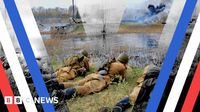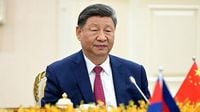As the 80th anniversary of the Soviet victory in World War II approaches, Russia is preparing for its annual "Victory Day" celebrations with a heightened sense of nationalism and militarism. This year’s events are particularly significant, as they coincide with the ongoing conflict in Ukraine, which the Kremlin frames as a continuation of its fight against fascism.
In Dubna, a town located eighty miles from Moscow, a park reverberates with the sounds of explosions and gunfire as actors reenact one of the final battles for Berlin in 1945. This historical re-enactment, part of the commemorations for the anniversary, draws a large crowd who witness the symbolic victory of the Red Army as they replace a swastika with the hammer and sickle. Among the spectators is Katya, whose grandfather fought in the war and went missing near Berlin. She reflects on her family's legacy, stating, "I'm here because my grandfather fought in this war. He went missing near Berlin. Much later we found out he'd been killed in January 1945." Her son is now fighting in Ukraine, volunteering for what the Kremlin calls a "special military operation."
Katya’s story is a poignant reminder of the personal costs of war, echoing the sentiments of many Russians who view the Great Patriotic War as a defining moment in their national identity. The war resulted in the deaths of over 27 million Soviet citizens, a statistic that weighs heavily on the collective memory of the nation. This year's commemorations are not only about remembering the past but also about reinforcing the narrative that Russia is once again under threat.
The Kremlin has been busy preparing for the May 9 celebrations, which will feature a military parade on Red Square attended by numerous world leaders, including China’s Xi Jinping, who is described by Putin as his "main guest." This visit is expected to deepen the ties between the two nations amidst rising tensions with the West. Xi's attendance comes at a time when the U.S. has shifted its foreign policy, leading to a realignment of global alliances. The strong camaraderie between China and Russia, as expressed in a recent article by Xi, emphasizes their shared history and opposition to Western hegemony: "The strong camaraderie between our two nations, forged in blood and sacrifice, surges onward unceasingly."
As part of the celebrations, the Kremlin has also proposed a three-day ceasefire with Kyiv, a move that Ukrainian President Volodymyr Zelensky promptly rejected, labeling it a "theatrical performance." Zelensky has been vocal about Ukraine’s right to defend itself against Russian aggression, warning that Kyiv cannot be responsible for what happens on Russian territory, especially amid ongoing drone attacks on Moscow.
In the lead-up to Victory Day, the streets of Moscow are adorned with patriotic symbols. The word "Pobeda," meaning victory, is displayed prominently on billboards and public transport, while tanks have been rehearsing their movements along Tverskaya Street for the parade. The event is designed not only to commemorate the sacrifices of the past but also to project strength and unity in the face of current challenges.
In a striking display of continuity, a newly unveiled monument in Khimki depicts a Red Army soldier alongside a modern Russian soldier, symbolizing the connection between past and present conflicts. Below the figures, framed photographs of fallen soldiers from the current war serve as a reminder of the ongoing sacrifices made in the name of national pride.
As the commemorations unfold, the Russian government continues to promote the narrative that it is once again fighting against fascism, drawing parallels between the Great Patriotic War and the current situation in Ukraine. Andrei Kolesnikov, a columnist for Novaya Gazeta, notes that the Great Patriotic War has always been a cornerstone of Russian identity, stating, "Historically and sociologically, victory in the Great Patriotic War was always a cornerstone of Russian united consciousness." This year, however, that narrative is being expanded to suggest that the conflict in Ukraine is part of a broader struggle against Western aggression.
Amidst the pageantry, there are voices like that of 98-year-old Fyodor Melnikov, who reflects on the horrors of war. His brother was killed in the Great Patriotic War, and he recites a poignant poem about loss: "A uniform I never wore, a battle I never saw. But in my mind's eye I see my brother going off to war. The only thing he said to me before he went was this: 'Live, little brother, be well. I will bring victory home.'" For Fyodor, the day is both a celebration and a somber reminder of the costs of conflict.
This year’s Victory Day is set against a backdrop of ongoing military operations in Ukraine, where Russia's initial expectations of a swift victory have turned into a protracted conflict. As the Kremlin prepares for a grand display of military might, the realities on the ground tell a different story, one of extended warfare and significant casualties.
With 29 world leaders expected to attend the parade, including Xi Jinping, the event is poised to showcase Russia's military capabilities while reinforcing its narrative of victimhood and resilience. The Kremlin has already faced criticism for its portrayal of the conflict as a fight against Nazism, despite being the aggressor in Ukraine. This duality of remembrance and aggression is a key theme in this year’s celebrations, as Russia seeks to unite its citizens under the banner of nationalism while navigating the complexities of international relations.
As May 9 approaches, the streets of Russia will be filled with symbols of victory, yet the underlying tensions and the realities of war loom large. The commemoration serves as a reminder of the past, but also as a call to rally support for the present conflict, blurring the lines between remembrance and propaganda. The legacy of the Great Patriotic War continues to shape Russia's identity, even as it grapples with the challenges of today.





